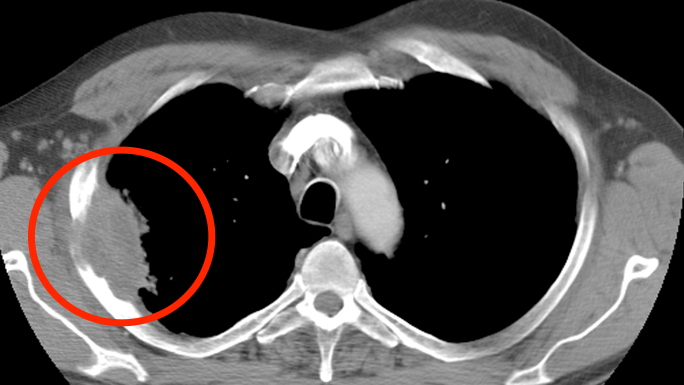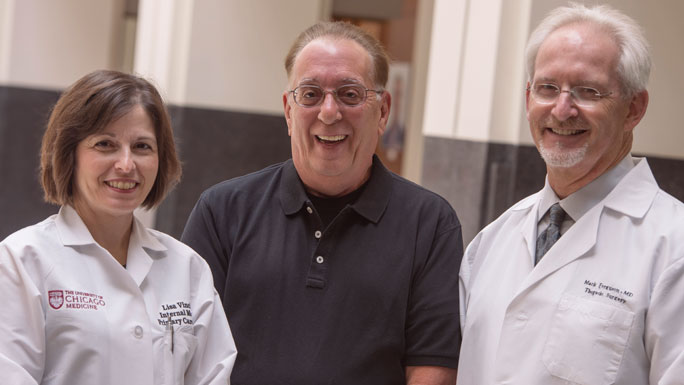Life after lung cancer: Biking, golfing, days at the beach

Thirteen years ago, Greg Klawitter underwent surgery for non-small cell lung cancer at the University of Chicago Medicine. Although he no longer needs to see Lisa Vinci, MD, medical director of the Primary Care Group at the University of Chicago Medicine.
A chest X-ray showed scarring in Klawitter’s right lung and an abnormality on two adjacent ribs. Because he was a smoker and also complained of sweats and fatigue, Vinci suspected cancer. A follow-up CT scan revealed a quarter-sized mass in the lung. Vinci referred Klawitter to Ferguson, an expert in the surgical management of cancers in the lungs, esophagus and thymus.
Ferguson gave Klawitter some grim news. The tumor in the lung was invading his ribs. Although further imaging tests indicated the cancer had not spread to other organs, the prognosis for his condition was poor.

"The tumor was clinical stage 3," Ferguson said. "At the time, the expected survival for this condition was about 25 percent." Surgical removal of the cancer offered the best chance for a cure.
Klawitter described his thoughts when he heard the lung cancer diagnosis with just one word: SCARY. But he appreciated that Ferguson didn’t sugarcoat the situation. As a street-wise cop, Klawitter had worked on the beat, at the desk and in the lock-up. He had dealt with life and death situations in some of Chicago’s worst neighborhoods. He wanted straight talk.
Ferguson says he always tries to explain things as clearly as possible to his patients so they know what they are facing and their options for treatment. "I show them their scans so they can better understand the findings and what needs to be done," he said. "Most patients appreciate a frank discussion."
In a three-hour open operation in May 2001, Ferguson removed about a third of the lung that contained the tumor as well as segments of four ribs. He then reconstructed the chest wall with a Gore-Tex® mesh patch.
"Greg was otherwise in good shape and did very well after the surgery," Ferguson said. "The goal was that he could resume a normal lifestyle and not require further treatment."

At the 5-year mark, the likelihood of Klawitter’s cancer recurring was very low. However, he requires ongoing monitoring to assess whether another cancer is developing, according to recent guidelines.
"As I was wheeled into surgery, I told Dr. Ferguson to do his best work, because I didn’t want to go yet," Klawitter recalled. Now, he rides his bike daily, plays golf often and spends time with his wife at their lake house in Southern Michigan.
Lung Cancer Treatment Today
The University of Chicago Medicine has long been at the forefront of comprehensive lung cancer treatment -- the multidisciplinary medical team has been meeting weekly since 1973. Today, advances in detection, imaging, surgical techniques, chemotherapy, radiation and targeted therapy are offering patients more treatment options and more hope for a cure.

Lung Cancer Care
At UChicago Medicine, we offer a wide range of lung cancer care options, including minimally invasive surgery and innovative targeted therapies, as well as clinical trials of promising treatments not widely available.
Learn more about our lung cancer care.
Mark K. Ferguson, MD
Mark Ferguson, MD, specializes in the surgical management of diseases of the lungs, esophagus and thymus. He is experienced in all techniques of lung and esophageal resection, including minimally invasive approaches to treating lung and esophageal cancers.
Read Dr. Ferguson's physician profile
